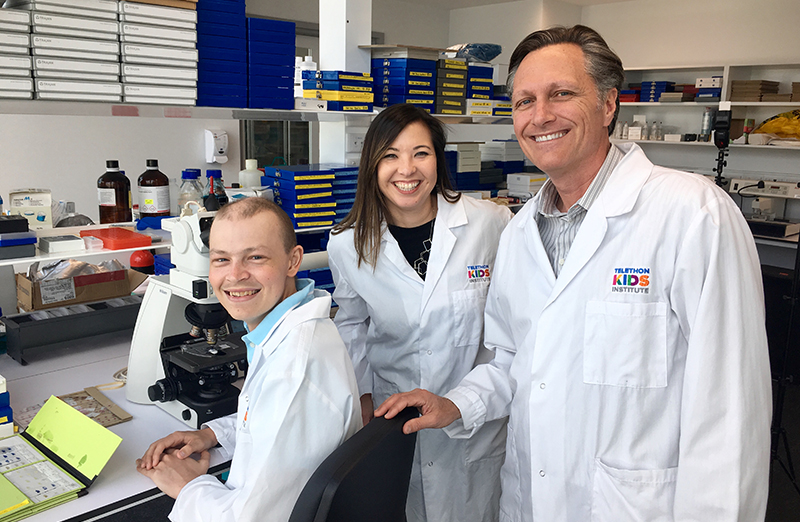Search
Research
Patient-Derived Orthotopic Xenograft Models for High-Grade Pediatric Brain CancersPatient-derived orthotopic xenograft (PDOX) mouse models are considered the gold standard for evidence-based preclinical research in pediatric neuro-oncology. This protocol describes the generation of PDOX models by intracranial implantation of human pediatric brain cancer cells into immune-deficient mice, and their continued propagation to establish cohorts of animals for preclinical research.
Research
High-dose chemotherapy for Ewing sarcoma and Rhabdomyosarcoma: A systematic review by the Australia and New Zealand sarcoma association clinical practice guidelines working partyPatients with high-risk or metastatic Ewing sarcoma (ES) and rhabdomyosarcoma (RMS) have a guarded prognosis. High-dose chemotherapy (HDT) with autologous stem cell transplant (ASCT) has been evaluated as a treatment option to improve outcomes. However, survival benefits remain unclear, and treatment is associated with severe toxicities.
Research
Towards precision cancer medicine for Aboriginal and Torres Strait Islander cancer health equityDelivering cancer control at scale for Aboriginal and Torres Strait Islander communities is a national priority that requires Aboriginal and Torres Strait Islander leadership and codesign, as well as significant involvement of the Aboriginal community-controlled health sector. The unique genomic variation observed among Aboriginal and Torres Strait Islander peoples may have implications for standard and precision medicine.
Research
Chemotherapy-induced peripheral neuropathy in children and adolescent cancer patientsBrain cancer and leukemia are the most common cancers diagnosed in the pediatric population and are often treated with lifesaving chemotherapy. However, chemotherapy causes severe adverse effects and chemotherapy-induced peripheral neuropathy (CIPN) is a major dose-limiting and debilitating side effect.
Research
Anoctamins and Calcium Signalling: An Obstacle to EGFR Targeted Therapy in Glioblastoma?Glioblastoma is the most common form of high-grade glioma in adults and has a poor survival rate with very limited treatment options. There have been no significant advancements in glioblastoma treatment in over 30 years. Epidermal growth factor receptor is upregulated in most glioblastoma tumours and, therefore, has been a drug target in recent targeted therapy clinical trials.
Research
Clinical Trials in the Brain Tumour Population: Challenges and Strategies for the FutureThis review identifies challenges and barriers to successful development of drugs in neuro-oncology trials at the preclinical, clinical and translational stages that we believe has contributed to poor outcomes for patients over the last 30 years.
Research
Cardio-Oncology Recommendations for Pediatric Oncology Patients: An Australian and New Zealand Delphi consensusCardio-oncology is a new multidisciplinary area of expertise that seeks to pre-emptively and proactively address cardiac complications that emerge during and following cancer therapy. Modern therapies including molecular targeted therapy and immunotherapy have broadened the agents that can cause cardiac sequelae, often with complications arising within days to weeks of therapy.
Research
Improving compliance with swallowing exercise to decrease radiotherapy-related dysphagia in patients with head and neck cancerDysphagia, one of the most common complications in head and neck cancer (HNC) treated with radiotherapy, can severely affect patients’ quality of life. Currently, because no “gold standard” treatment exists, swallowing exercise remains the main rehabilitation strategy for dysphagia. However, patients’ compliance with long-term swallowing exercise is only 40%, thus, greatly compromising outcomes. This article aims to analyze thefactors influencing swallowing exercise compliance in patients with HNC and explains strategies developed to date for improved rehabilitation outcomes.

News & Events
West Coast Cancer Meeting 2025Join us as WA’s cancer research community comes together at the inaugural West Coast Cancer Meeting.

News & Events
Three-continent clinical trial aims to improve survival for aggressive kids’ brain cancerThe Kids Research Institute Australia and Perth Children’s Hospital will lead an international clinical trial of a novel drug combination they hope will increase cure rates for one of the most aggressive forms of childhood brain cancer.
